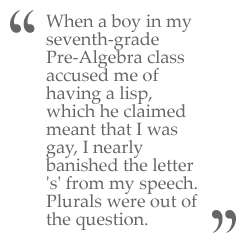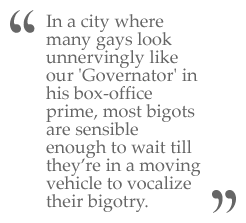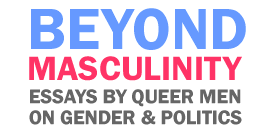|
 friend of mine who’s taking a French class at San
Francisco State University told me recently how the
professor asked students, one by one, to answer the
question, en français,
“How would you describe your ideal man or woman?” My
friend Toby began to describe his ideal—his boyfriend
Marco (“His eyes are brown, his hair is black…”)—but the
instructor suddenly interrupted Toby mid-sentence. “No,
no,” she scolded him in English. “You’re not supposed to
use the masculine form of the possessive. You should say, ‘Her eyes, her
hair.’”
friend of mine who’s taking a French class at San
Francisco State University told me recently how the
professor asked students, one by one, to answer the
question, en français,
“How would you describe your ideal man or woman?” My
friend Toby began to describe his ideal—his boyfriend
Marco (“His eyes are brown, his hair is black…”)—but the
instructor suddenly interrupted Toby mid-sentence. “No,
no,” she scolded him in English. “You’re not supposed to
use the masculine form of the possessive. You should say, ‘Her eyes, her
hair.’”
 Toby thought the whole thing was pretty funny, but I
wasn’t so amused. I spent my whole adolescent life
changing pronouns and possessives, altering my language
to pass as straight in school. I even learned to tell
fag jokes as often as possible so they wouldn’t be told
about me. When a boy in my seventh-grade Pre-Algebra
class accused me of having a lisp, which he claimed
meant that I was gay, I nearly banished the letter “s”
from my speech. Plurals were out of the question. Things
became singular, alone. Toby thought the whole thing was pretty funny, but I
wasn’t so amused. I spent my whole adolescent life
changing pronouns and possessives, altering my language
to pass as straight in school. I even learned to tell
fag jokes as often as possible so they wouldn’t be told
about me. When a boy in my seventh-grade Pre-Algebra
class accused me of having a lisp, which he claimed
meant that I was gay, I nearly banished the letter “s”
from my speech. Plurals were out of the question. Things
became singular, alone.
If I had known then that I’d see that same boy in one of
the many gay bars in the Castro some fifteen years
later—if I’d understood that he was just the first in a
long line of gay men who’d pressure me to pass so they
wouldn’t feel so lonely in the closet—maybe I wouldn’t
have taken him so seriously. But take him seriously I
did. As a result of my linguistic efforts, I probably
have a larger vocabulary than many of my old classmates,
but fifteen years later I still shy away from sibilant
words whenever I’m the least bit nervous —like when I’m
out on a date with a guy who manages to wear his
masculinity with some semblance of authenticity and
self-possession.
Now in college and talking to my openly gay friend Toby
in the office of the Queer Alliance, San Francisco State
University’s gay student group, I realized that the same
pressure to conform I’d felt in the seventh grade was
still alive and well here in San Francisco. Only the
words had gotten bigger. Instead of being accused of
being a cocksucker, I might be accused—if I were to take
a French class too—of improper use of the masculine
form.
When I arrived at SF State, I was ready to relax and
stop fighting. After years of straining to pass as
heterosexual in school, followed by more years of
activism and advocacy for queer youth, I was ready to be
on the academic equivalent of R&R —basking in the warm
glow of queer community that San Francisco promised. I
was ready to be accepted with open arms into that
community, and I expected that I’d find a boyfriend by
the end of my first semester.
But it wasn’t that simple. When I arrived, I was shocked
to find that I still felt relatively invisible. What was
going on? Hadn’t thousands of students from all across
the country come here seeking safe haven from their
backward backwater hometowns? The Castro was full of
such refugees, even though they were loath to talk about
such things at their favorite watering holes. I knew
that, ever since the Gold Rush, San Francisco had been a
place that attracted misfits and miscreants dreaming of
hidden riches and open lives. That was the city’s
reputation, but where were these misfits now? Changing
their language in classrooms, changing their behavior on
the streets to avoid the harassment that still happens.
A lot of people, including most of the gay people I
know, think San Francisco is one of the best places in
the world for gay people to live. But if San Francisco
is one of the best places in the world for us, that says
more about the sorry state of the world than it does
about San Francisco. Sure, you can hold hands with your
same-sex partner in the Castro. But travel six blocks
north, south, east or west from the intersection of
Castro and Market streets, and you’re just as likely to
be sneered at as you are to be cruised. You might even
be catcalled by passing motorists.
 In a city where many gays look unnervingly like our
“Governator” in his box-office prime, most bigots are
sensible enough to wait till they’re in a moving vehicle
to vocalize their bigotry. Just last week, in fact, I
was walking through Hayes Valley, the upscale
neighborhood just east of the Castro that’s home to our
city’s LGBT Center, when a carload of boys yelled “fag.”
At first I thought maybe they were calling me “fat”— was
this, I wondered, a driveby attempt to urge me to spend
more time on the Stairmaster? But no, they didn’t care a
lick whether I toned up my midsection or not; they were
calling me a faggot, urging me to tone down my faggish,
gay, unmanly appearance. Their jeers were diminished
slightly by the Doppler effect, but rang clearly in my
ears even after their car had disappeared over a hill. In a city where many gays look unnervingly like our
“Governator” in his box-office prime, most bigots are
sensible enough to wait till they’re in a moving vehicle
to vocalize their bigotry. Just last week, in fact, I
was walking through Hayes Valley, the upscale
neighborhood just east of the Castro that’s home to our
city’s LGBT Center, when a carload of boys yelled “fag.”
At first I thought maybe they were calling me “fat”— was
this, I wondered, a driveby attempt to urge me to spend
more time on the Stairmaster? But no, they didn’t care a
lick whether I toned up my midsection or not; they were
calling me a faggot, urging me to tone down my faggish,
gay, unmanly appearance. Their jeers were diminished
slightly by the Doppler effect, but rang clearly in my
ears even after their car had disappeared over a hill.
Accusations like this, such blatant reminders that I’m
not cutting it as a “real man,” are blessedly rare now
that I’m all grown up. Which makes me grateful,
sometimes, to be single. The odds of being pegged as gay
go up, after all, when you’re coupled, and if you two
manage to walk out of the gay ghetto into some other
neighborhood without being hassled, you’re aware with
every step you take that you’re making a political
statement. If you lean over to kiss your lover in a nice
restaurant (since going to a nice restaurant arguably
means leaving the Castro), you’re not just being
affectionate, you’re being radical. And if your date
seems cold and distant over dinner, you’re left to
wonder, “Is Bob not interested in me, or is he afraid of
being attacked?” Small wonder, then, that even in a city
that’s about 25 percent gay, very few gay men seem to be
in long-term relationships... (continue reading)
|




11 COMMENTS ON THIS ESSAY:
If I had 1% more estrogen in my body, I would have probably cried my eyes out when I finished reading this. It was phenomenal! Thank you so much.
Brent Calderwood's essay reminded me of my Italian conversation class. My instructor had a bad habit of constantly interupting me to correct my Italian but when it came time to decribe my ideal mate I corrected my teacher: "Non e' "lei', e' "lui"!" (Translation: It's not "she", it's "he"!) After that my intructor had to constantly prove how liberal and pro-gay she was, the cute Chilean class mate changed his mind about going to the movies with me and most of the other students were cool. It was a great way to come out in another language. Back to Brent's main point, it was a sad day when I realized there is as much pressure to conforn inside the gblti community as outside in the larger world. Joe
A great essay for sure, although I am not sure I completely agree: being gay does not necessarily mean you have to be swishy and skinny. I am sure some people are uber-queers hiding in muscle/macho bodies for fear of rejection, but there are some of us who just like how we look when ripped and who do like cars, sports, home renovations, sitting on the sofa drinking beer, burping and scratching ourselves, etc... I've even been accused of "trying to act to macho and I wasn't pulling it off", but the truth is, this is the way I act and who I am.
I agree with you Nicolas, the idea that being gay is pure formula, kind of suggests, to me, that being gay is a commercial pursuit.
That's why i consider myself to be queer, and never gay.
Gay has been rendered into retreat, and if you don't behave a certain way, fellow gays will assume you are scared, or closeted.
There is a constant fight, and it isn't just with the hetero standard but it exists amongst ourselves.
“You’re not supposed to use the masculine form of the possessive. You should say, ‘Her eyes, her hair.’”
This reminded me of when i said Loca instead of loco, my teacher scolded me, but i explained that the masculine and feminine are traits of the past and that soon they will be left behind.
Nice essay
It really is a sad tale!
You burst my bubble about SF.
Guess I'm a bit of an idealist myself.
Anyway, you've made an interesting point here.
Tnx :)
Have you ever been to the town of Sitges, Spain? (Near Barcelona). It is full of super-pumped gays with the biggest muscles I've ever seen. When you walk into Sitges as a tourist all you see is the same type of gay men. No families, no old people, no women (except the tiny lesbian minority). It was very bizarre to me at first because where I grew up (Coventry, UK) the gay scene looked the complete opposite: skinny jeans on painfully skinny boys, indie shirts and emo haircuts.
Nocolas--
I don't think he was saying that gay men are supposed to be effeminate; I think he was saying that many of those who happen to be effeminate are forced to hide it, which is dishonest and sycophantic. So I don't think there is any need for masculine gay men to be upset by his premiss.
And we all know how many "straight-acting" fellows there are out there. They even claim, literally, to "act" straight (since that's what a "real" man acts like, apparently, except that they still have sex with men, funnily). Yet, for some reason, we never point out their dissemblance--only that of the gays who pretend to be flamboyant queens.
Talk about a double-standard.
Excellent essay. It made me tear up a little.
Actually I think that the epithet-spewing cowards hiding in a fast car are proof that we're winning. It takes a long time to change the world.
Gay men bring all kinds of hate and insecurity with them into adulthood; we play out the bitchiness and throw shade because it's what we were taught in junior high. I'm hopeful this, too, will diminish as the younger generations have better and better role models to emulate.
Patience. We're winning.
Why can't people just be who they are?
We are born alone and we die alone. Everywhere in between we try to fit in by finding other people who share our values and interests. People always gravitate toward others with whom they have something in common. Who can really say that the people you observe in the Castro are "hiding inside the suits of armor they’ve created" or, are just being themselves? Do "before and after" pix exist?
Who exactly is protecting themself from being rejected by other gay men?
I think it is easy to generalize when looking from the outside into any of the many gay sub-cultures. Although I have no doubt that self-hatred is and probably always will be a fact of life for many people due to what is perceived as non-acceptance (whether it be gender, race, sexual preference, age, etc.), it is still up to each individual to find for themself where that place is that they will no longer feel fear. It is the responsibility of the rest of us to allow them their journey along the path of life and perhaps even make a friend or 2 along the way. What really makes all of us strong (therefore taking away all fear) is respect for all the diversity among our people.
Yes, look each other in the eye and see ourselves in one another.
Brent, your essay makes some very important points about acceptance (not tolerance) and how much further American society has to go to achieve that goal. I really appreciated that your essay made that point explicitly and clearly.
Your opening vignette about your friend and his French teacher, however, unfortunately, is not quite right. In the French language, possessive pronouns (my,his, hers theirs...) are NOT related to the subject (your friend in your example), but the object of possession. That is to say, whether you are a man or a woman, you use the same adjectives to designate hair, eyes (both of which are plural in the French). So, the teacher was absolutely right in correcting your friend -- it is not the masculine singular (son -- his eyes), but the plural (ses yeux, ses cheveux -- eyes and hair both in the plural in French). This is not just a nit picky grammar point. There is NO way you can give away the gender of the person you are describing if you do not explicitly state his/her gender. Anne Gareta (if you read French) has written an entire novel (Sphinx, 1986) about the love between two people in which the reader never finds out the gender of the main characters, a task that would have been impossible in English.
Having said all this, I appreciate the point you try to make -- people can be so heteronormative, that they refuse to acknowledge the possibility that same sex relations could and do exist.
Brent,
I wonder how much of this bulking and gym behavior have something to do with AIDS as much as with Masculinity.
I remember the days of wastings, of KS and of trying all kinds of things to "feel better".
I think we have also gone overboard on the gym as a way to in some way reclaim our bodies, or make it so folks don't see us as "sick".
Or maybe a bit of both.